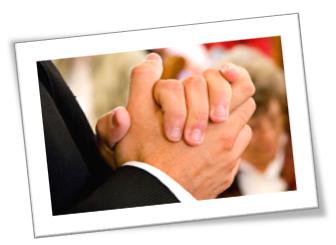Consistorial Prayer and "Handshake"
Consistorial Prayer and "Handshake"
Why is there a prayer in the consistory prior to the service and what is the meaning of the handshake at the foot of the pulpit?
The prayer offered in the consistory room before the service probably originated at the time of the Secession. When the congregations of the Secession originated, church services were often disturbed by military or police forces. Prior to the service, they were not certain whether it would take place undisturbed. Therefore the consistory felt the need to first join in prayer before the service began. They prayed to the Lord that the Word of the Lord might be preached in peace, that the Lord would strengthen the preacher and that the gathering together of the congregation might not be broken up. In the congregations of the Secession and also in the congregations which originated from the Doleantie this custom continued, even when the danger of disturbance was past.
Although not strictly commanded according to Reformed liturgy, prayer in the consistory is not superfluous. The consistory and the minister are present in the consistory room before the church service begins. It is in this official circle that the officiating elder asks the blessing of the Lord upon the service of the Word and upon the minister.  The prayer of the officiating elder is an official prayer. In behalf of the consistory he seeks the face of the Lord that it may please the Lord to strengthen the minister in his labor. This prayer, which ought not be long, is not one in which the entire need of Christendom is enumerated. It must be an imploring of a blessing from God for the preacher and a blessing upon the preached Word in the midst of the congregation. Whenever it is thus done, it may be to the encouragement and strengthening of the preacher, upon whom rests the task of preaching the Word of God according to the meaning of the Spirit. He then feels that in the prayer of the officiating elder he is carried by the entire consistory, and leaves the consistory room with the conviction of unity and responsibility as the public worship is begun.
The prayer of the officiating elder is an official prayer. In behalf of the consistory he seeks the face of the Lord that it may please the Lord to strengthen the minister in his labor. This prayer, which ought not be long, is not one in which the entire need of Christendom is enumerated. It must be an imploring of a blessing from God for the preacher and a blessing upon the preached Word in the midst of the congregation. Whenever it is thus done, it may be to the encouragement and strengthening of the preacher, upon whom rests the task of preaching the Word of God according to the meaning of the Spirit. He then feels that in the prayer of the officiating elder he is carried by the entire consistory, and leaves the consistory room with the conviction of unity and responsibility as the public worship is begun.
Furthermore, it is, according to Reformed liturgy, preferable that the elder who offered prayer in the consistory also leads the preacher in, i.e., going before him to the pulpit and shaking his hand. When the preacher descends from the pulpit after the service, it is the same elder who shakes his hand again and leads the way back to the consistory.
Opinions vary in the Reformed circles as to the significance of this handshake at the foot of the pulpit. In any case, there is in the handshake more than polite formality or cordiality.
The administration of the Word is an official task. God is a God of order, Who has given rules by which the preacher must abide and to which he must submit. The Word of God must be proclaimed from out of the consistory, upon whom the King of His Church has placed the governing of the congregation. By the handshake which the preacher receives at the foot of the pulpit before the eyes of the entire congregation, it is revealed that this is an official service. The consistory gives God's called and qualified minister of the Word the opportunity to fulfil his task. Therefore the service is more than a lecture. It is an official proclamation of God's Word in the midst of the congregation.
At the same time, the congregation is shown by the handshake, that the consistory assumes responsibility for what takes place in the church service and for what is preached. Moreover, the handshake is also an encouragement for the preacher. He knows that he does not stand alone in the performance of his responsible task; the consistory stands behind him to support him.
This responsibility of the consistory also includes the handshake given by the elder at the conclusion of the service. However, this handshake does not mean that every word and expression of the preacher is accepted by the consistory. Naturally, a minister may well say some things in his sermon regarding which the officiating elder thinks differently.  It can also happen that another interpretation is given about a certain text than that which the elder himself thinks it should be. There remains freedom of interpretation, as long as it is not contrary to the doctrinal standards of the church. A mere difference of view is not reason for the officiating elder to refuse to shake hands after the service. He may do so only when the sermon transgresses the test of God's Word and the Church's doctrinal standards. Moreover the officiating elder should always bear in mind that he acts in behalf of the whole consistory and not only for himself. No personal feelings or opinions must dictate the elder here, but the opinion of the whole consistory.
It can also happen that another interpretation is given about a certain text than that which the elder himself thinks it should be. There remains freedom of interpretation, as long as it is not contrary to the doctrinal standards of the church. A mere difference of view is not reason for the officiating elder to refuse to shake hands after the service. He may do so only when the sermon transgresses the test of God's Word and the Church's doctrinal standards. Moreover the officiating elder should always bear in mind that he acts in behalf of the whole consistory and not only for himself. No personal feelings or opinions must dictate the elder here, but the opinion of the whole consistory.
It is a very serious thing to refuse to give the "handshake." When it is deemed necessary, however, this matter must be soon discussed thoroughly by the entire consistory with the minister. If in the opinion of the consistory it becomes evident that the officiating elder has acted wrongly, this elder must express regret for his action. It must also then be announced before the congregation because it has taken place before the eyes of the congregation. If the action of the officiating elder has the approval of the consistory, this matter must be resolved with the minister in order to prevent further offence and commotion in the congregation.

Add new comment